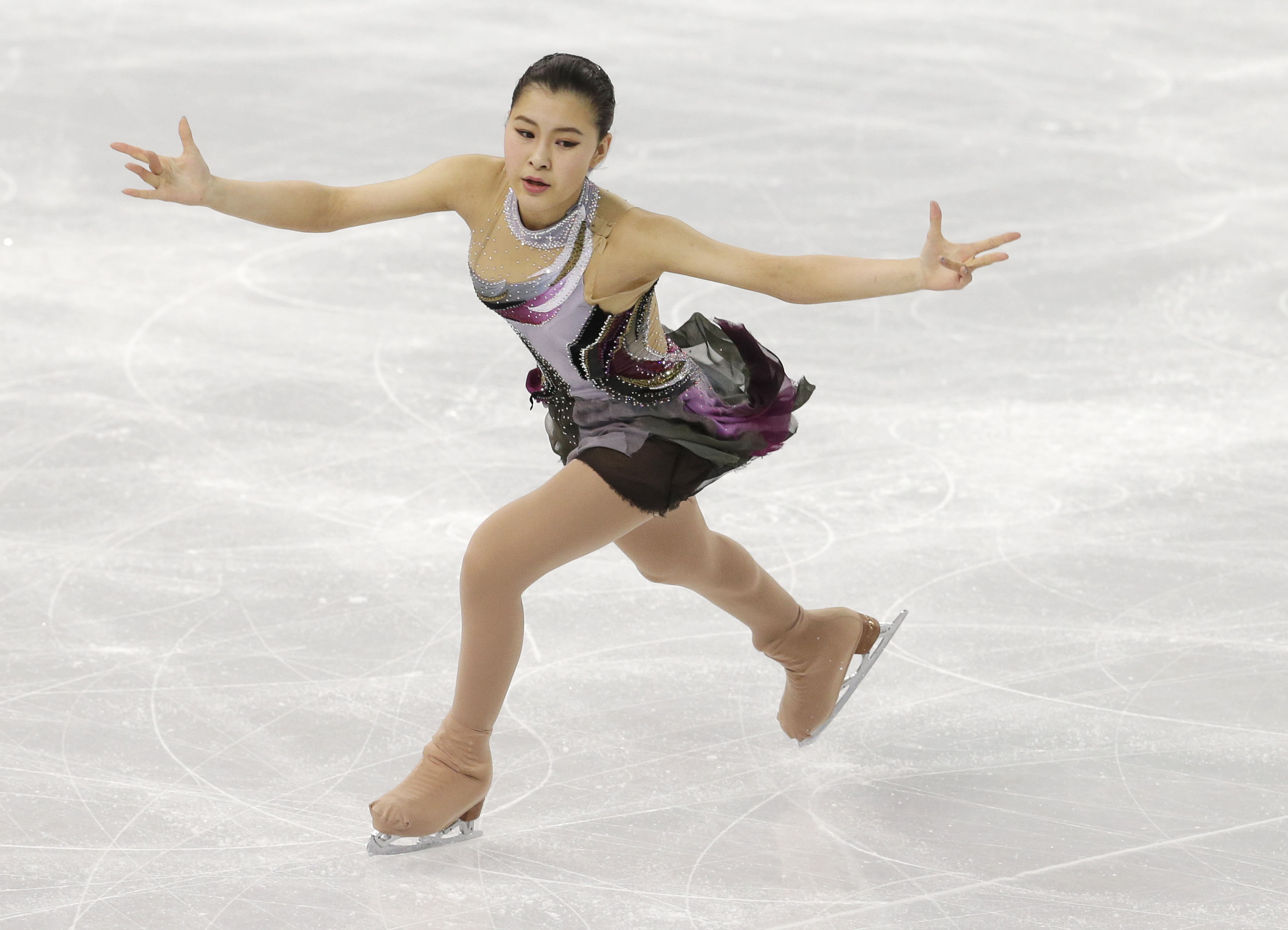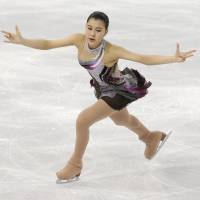It remains one of the great mysteries of Japanese skating.
An athlete who seemingly has all of the physical ability and presentation skills to be one of the very best in the world, but can't get over the final hurdle when it counts.
• She was the world junior champion in 2010.
• She is mentored by one of the most renowned Japanese coaches around.
• She was dubbed "Mini Mao" by the Japanese media.
• She has been on the skating radar going back to her days as a novice.
• She hails from Nagoya — which has produced many of the greatest skaters in the nation's history.
Despite all of the above, the skating community is still waiting for Kanako Murakami's breakthrough in the senior ranks on the international stage.
She has earned gold (2014) and bronze (2013) medals at the Four Continents, and took home the bronze as the 2010 Grand Prix Final. But at the major events — the world championships and Olympics — has come away empty-handed.
Starting with the 2011 worlds, Murakami has finished eighth, fifth, fourth and 10th, respectively, in the past four years. She placed 12th at last year's Sochi Games.
The 20-year-old Murakami is popular with both her fellow skaters and fans alike. Her effervescent smile has been lighting up television screens and print media pages for years.
Despite finishing fifth at the recent Japan nationals, Murakami was selected by the Japan Skating Federation to represent the Hinomaru in Shanghai at the senior worlds for the fifth straight year.
Ice Time has always been wowed by Murakami's potential, but wondered why she has not been able to take the final step.
In an effort to gain some insight on the subject, Ice Time turned to some experts for their analysis on what is holding the Chukyo University student back.
An international judge, who has watched the 162-cm Murakami skate for years, shared the same sentiments as Ice Time.
"Kanako is one of my favorite skaters," the judge said. "She is getting better on the artistic side the past few years. She has grace and moves with the music better than any other skaters in Japan."
The judge then relayed what she sees as Murakami's main issue.
"The problem is her jumps. It hasn't changed in the past few years," the judge stated. "As you can see before the jumps, she brings her feet up or her arms up and it ruins the flow of the program.
"It's not like dancing. In the dance there is a jump. It's dance, prepare, here I go, I will jump, jumped, and dance again."
The judge cited Murakami's propensity for not technically completing her jumps as another issue.
"She doesn't have a triple lutz that has a correct edge," the judge noted. "On most of her triple jumps, she doesn't rotate all the way around. These are the problems she hasn't fixed."
The judge believes the jump problem is significant.
"Young skaters are doing jumps with more speed, more height, and with more flow," the judge said. "Kanako does have speed, but not at the recent nationals."
As to why Murakami has not garnered any major medals as a senior, the judge puts it down to numbers.
"She has been going against many good skaters for many years. Mao, Akiko (Suzuki), Carolina (Kostner), Yuna (Kim). She just didn't have the luck to beat them."
With the recent wave of young Russian skaters emerging, the judge thinks Murakami's task has become more difficult.
"The young Russians are doing more jumps that are difficult, more spins that are flexible and fast. But, honestly, Kanako is an artist, not the athlete kind that just jumps and spins. She has feeling in each of her movements."
When asked if training with a coach overseas, like many Japanese skaters have in recent years, would benefit Murakami, the judge didn't think it would have much impact.
"I think she has a good coach (Machiko Yamada) and a good training rink in Nagoya. I don't think she needs to train somewhere else."
Summing up the feelings of many, the judge concluded by saying, "I want her to skate her best in Shanghai. I love her skating."
A skating writer, who has followed Murakami's career for many years, thinks she just may not deal with pressure well.
"I have been watching Kanako for a long time," she said. "It seems like it is a mental thing. Something is missing for her. She just can't seem to skate well recently."
The writer believes the absence of Mao (sitting out this season) and Suzuki (retired from competition) this season has only added to Murakami's anxiety.
"I think in Nagano (at nationals) she became weak from the pressure," she said.
When I asked exactly what she meant, the writer indicated that Murakami likely felt stress to excel.
"I think without Mao and Akiko there, Kanako thought she had to do well," she said.
This theory is very interesting, because the day before the nationals started Murakami was asked about the absence of her skating senpai.
"Practice is different without Mao and Akiko around," she said. "I felt a bit sad not seeing them here. I have been trying to imagine that they are still here this year."
To her credit, Murakami is both sincere and dedicated, and acknowledges her own shortcomings.
"I worked the hardest ever preparing for the nationals, but my skating was still flawed," Murakami said after being named to the team for worlds. "I have learned that I need to work even harder. In preparation for the worlds, I will work on fixing my jumps."
Like countless others in the skating world, the writer knows Murakami can ascend higher.
"I think she can improve," she stated. "She has good skills and can jump high. She can definitely get higher technical scores."
The writer then gave an example of what she meant.
"Kanako had the highest program component score in the short program (despite finishing ninth) at the nationals. That shows she has the ability to do much better."
Nice gesture: Veteran skating writer Phil Hersh of the Chicago Tribune cited Yuzuru Hanyu in his year-ending awards column last month as the male world athlete of the year. The Olympic and world champion moved Hersh with his humble comments after winning the gold medal in Sochi last February.
"This choice owes less to how Hanyu skated in earning Olympic gold (breathtakingly brilliant in the short program, sloppily good-enough-to-win in the free skate) than to the remarkable perspective this 19-year-old showed when asked what being the first Japanese man to win an Olympic figure skating title might mean to his city, Sendai, which suffered devastation in the March 11, 2011, earthquake he experienced firsthand.
"Yes, I am an Olympic gold medalist now, but this medal cannot help the recovery in that region," Hanyu said through a translator. "I feel like I am helpless here. I feel like I am not making any contribution."
















With your current subscription plan you can comment on stories. However, before writing your first comment, please create a display name in the Profile section of your subscriber account page.